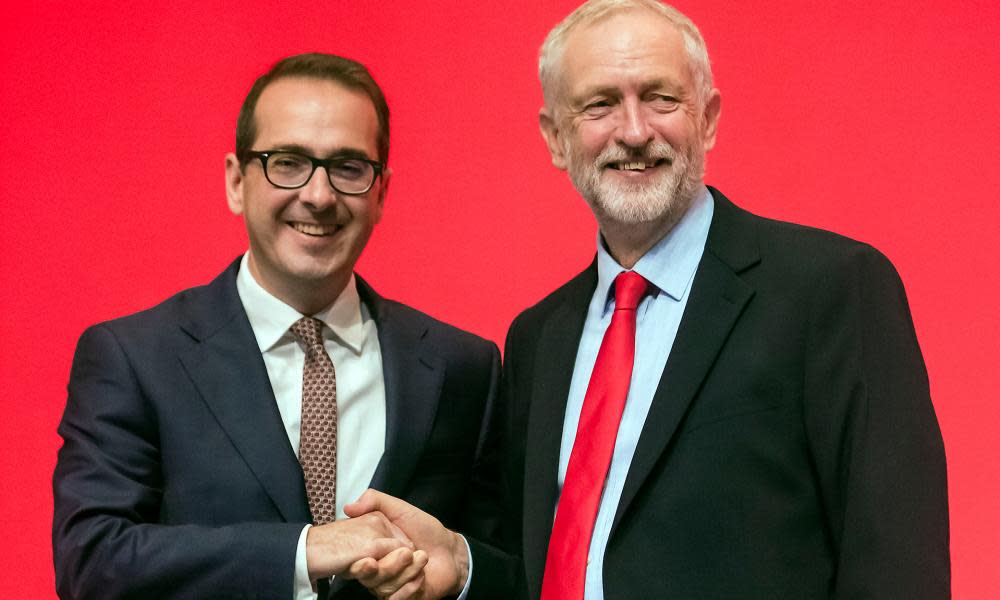Corbyn faces clash with Labour members over second EU referendum

Minutes after trouncing Owen Smith and winning his second Labour leadership contest in September 2016, Jeremy Corbyn promised to reward the mass membership that had backed him by giving them more power inside the party. “The participation is even higher, and my majority is bigger, and the mandate is very strong. So let’s use it to reach out,” he said. “With this huge membership, that has to be reflected much more in decision-making in the party.”
Two years on, as delegates gather in Liverpool for Labour’s conference, the same mass membership of more than 500,000 people is beginning to flex its muscles.
It is still overwhelmingly loyal to Corbyn. But there are key issues of policy and party democracy on which it now wants to make its mark, and hold Corbyn to his word. As one activist from the pro-Corbyn movement Momentum put it: “In Liverpool we will see whether we really have become a party of the members. Or are we still one of party management?”
The biggest issue, and largest test of “member power” will be over Europe. It is the subject on which Corbyn is most out of kilter with his own supporters. He is an old-fashioned Eurosceptic who does not seem to mind that the UK is on course to leave the EU. Most of his members, however, take a very different view.
A YouGov poll of more than 1,000 Labour members shows extraordinary levels of support both for staying in the EU and holding another referendum to give British people a chance to do so. Some 90% of Labour members say they would vote to stay in if there were a referendum today. And 86% would back a public vote on the outcome of Brexit negotiations. Some 81% believe their standard of living would get worse after Brexit and 89% say it would be bad for jobs.
Up until now Corbyn has been cool about the idea of a second referendum. He has not ruled one out, but prefers to call for an early general election to address Brexit concerns. This week, however, Labour members may well push him to a position where, instinctively, he has tried his damnedest not to go.
More than 140 Brexit motions – a record for any single issue – have been submitted to conference by local parties and unions. Most of them call for the party to back another referendum. Many want Labour to make support for a public vote explicit in its next manifesto, should the government collapse in the coming weeks, and an election be called. Last year the party dodged a proper debate and vote on Brexit to avoid embarrassment for the Eurosceptic leadership. This year it knows it can’t if it is to have any credibility as a members’ party at all.
The key Brexit debate and votes will happen on Tuesday morning. But on Sunday the real arguments will begin, when all the unions and party branches that submitted Brexit motions try to agree a form of words – a composite motion (or possibly two) – to vote upon on Tuesday.
Were conference to back a clear commitment to another public vote, it could be a decisive moment not just for Labour, but for the whole country and the UK’s position in the world.
So big is the decision that some pro-EU Labour activists fear there will be last-minute pressure from people high up in the party to deliver a fudged motion that will keep options open, making any commitment to another referendum weak and vague. If that happens, it will not go down well with many, young fiercely pro-European, members. “Given the strength of support for another referendum it will make a nonsense of Labour democracy,” said one young activist. “It will be a complete travesty of what Jeremy says this party is about.”
It would also risk souring relations with the more driven elements of the membership pressing for party reform, who are fearful of being thwarted on other fronts at conference as they battle for more party democracy.
Momentum is now worried that it may not win its battle for “open selections” of MPs before every election, because of opposition from some in the union movement and senior MPs, including shadow chancellor John McDonnell and deputy leader Tom Watson, who say it would be divisive at a time when unity is vital before a possible election.
By Friday night more than 25,000 people had signed a Momentum petition backing open selections, but they may not get their way. There is also a Momentum petition backing changes to the rules on selecting the next leader, which would lower the threshold of support necessary to get on the ballot paper (making it easier for a leftwing candidate). Again, the plan may not get through.
The vast majority of Labour members are pro-European and in favour of reform of their party. Two years ago Corbyn pledged to empower them, in the glow of his second leadership victory. In Liverpool this week he will be under intense pressure to begin to deliver on that promise.

 Yahoo News
Yahoo News 
